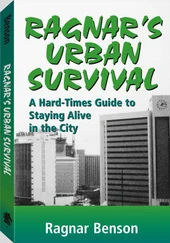Ragnar Benson - Ragnar's Urban Survival - A Hard-Times Guide to Staying Alive in the City
Здесь есть возможность читать онлайн «Ragnar Benson - Ragnar's Urban Survival - A Hard-Times Guide to Staying Alive in the City» весь текст электронной книги совершенно бесплатно (целиком полную версию без сокращений). В некоторых случаях можно слушать аудио, скачать через торрент в формате fb2 и присутствует краткое содержание. Год выпуска: 2009, ISBN: 2009, Жанр: Старинная литература, на английском языке. Описание произведения, (предисловие) а так же отзывы посетителей доступны на портале библиотеки ЛибКат.
- Название:Ragnar's Urban Survival: A Hard-Times Guide to Staying Alive in the City
- Автор:
- Жанр:
- Год:2009
- ISBN:1581600593
- Рейтинг книги:5 / 5. Голосов: 1
-
Избранное:Добавить в избранное
- Отзывы:
-
Ваша оценка:
- 100
- 1
- 2
- 3
- 4
- 5
Ragnar's Urban Survival: A Hard-Times Guide to Staying Alive in the City: краткое содержание, описание и аннотация
Предлагаем к чтению аннотацию, описание, краткое содержание или предисловие (зависит от того, что написал сам автор книги «Ragnar's Urban Survival: A Hard-Times Guide to Staying Alive in the City»). Если вы не нашли необходимую информацию о книге — напишите в комментариях, мы постараемся отыскать её.
Ragnar's Urban Survival: A Hard-Times Guide to Staying Alive in the City — читать онлайн бесплатно полную книгу (весь текст) целиком
Ниже представлен текст книги, разбитый по страницам. Система сохранения места последней прочитанной страницы, позволяет с удобством читать онлайн бесплатно книгу «Ragnar's Urban Survival: A Hard-Times Guide to Staying Alive in the City», без необходимости каждый раз заново искать на чём Вы остановились. Поставьте закладку, и сможете в любой момент перейти на страницу, на которой закончили чтение.
Интервал:
Закладка:
Trading services for goods isn't usually wise for the holders of goods, unless the service is of unusual value.
Labor
Trading skilled labor for consumables or capital goods is frequently done in city survival situations. An electrician trading his skill to rebuild a generator for an extra tire for his trailer comes to mind as an example. Time is very much of a premium in all true survival situations, so this isn't quite a matter of trading nothing for something. But almost.
People rapidly become experts at something in absolutely every survival situation. Even American Indians specialized. Survivors in Beirut, Berlin, Madrid, or wherever we look all specialized. It's the nature and core of survival as those in the remaining society reestablish some sort of economic order. The reason survivors are so busy is because they often perform tasks they are not good at, using tools not specifically designed for the task.
The rule in cases where a survivor must engage outside specialized help is, as much as possible, to offer to trade their skilled labor for your skilled labor rather than giving up scarce ammunition-batteries-matches-type trade goods. This won't work in the case of a need for a brain surgeon, but you certainly understand the concept.
BARGAINING
Bargaining in survival situations, either for money or for other goods, will be common. Most Americans have no clue how to bargain. Some consider the exercise to be tacky
Here is a brief summary of a nonthreatening method of bargaining that is usually effective and does not impinge on the desire of most Americans not to be confrontational. Americans really don't like to come right out and tell the other guy his stuff is priced too high and that they will only offer so much. This is too rude and abrupt, even for city survivors who, in prior lives, may have been very rude and abrupt.
Begin by determining that the other guy really has something you need at the retreat. In survival situations, it is common for owners not to display valuable goods till the deal is fairly far along. If you have nothing he particularly wants, then assume the deal will have to be for cash. This original posture should be stretched out as long as possible. Part of any successful bargaining technique involves inducing the other party to invest time in the process.
Perhaps it is time spent listening to information about the quality of the item. Maybe it's the item's history or the owner's history; his current survival problems, health of his wife and kids, the grandkids, weather, sources of supply, position of the enemy or whatever. Americans tend. not to be listeners. But in this case you gotta spend at least 15 m-nutes earnestly BS-ing and listening.
When he finally gets around to setting his price, don't react by saying it's too high. Simply tell him that this item is exactly what you need and want, that :t is in the condition you hoped for, and that he has talked you into the item. You like the item so much you only wish you could afford it. Lay it on thick about wanting the item, but it is out of your reach financially. At times sellers will voluntarily lower their price, without a buyer's counteroffer.
Make up some lame excuse why you can't afford the item. "Just traded my last two flashlights for a generator belt," says you. Also, be mentally prepared to simply walk away from the deal if the seller doesn't respond.
Usually the seller will ask how much you can afford to pay. Don't lowball him, which will expose the game. Simply say he could help out a bunch by selling it for X amount. At this point, it is incumbent upon you to find some reason for the fellow to help by lowering his price. Usually this reason originates in the initial conversation. Maybe it's the offer of your help in your special area of expertise in the future.
The main goal is not to confront him harshly or be belligerent in any way, but to keep on talking in a manner that convinces the seller that he should help you and that it is now his problem to make the sale.
By not being confrontational when no deal is made, it is easily possible to come back the next day with another offer. You might claim, "I found another 5 gallons of gas in our storage area," or whatever.
This is exactly the system used throughout the Orient, where saving face is of utmost importance. It also nicely fits most Americans' personalities. After practice, count on at least a 75-percent success ratio.
Chances to trade for necessary and even unnecessary items are far greater in the city than they are in the country. More people and more goods lying about to trade for make this possible. Some survivors, who by luck or chance happen to store the correct trade goods, can make up for complete ignorance or lack of planning. Some will make a fortune. I wouldn't want to play it this close, but the been there, done that crew claims it frequently happens.
Chapter 11

Guns
Ownership and deployment of proper firearms is a sufficiently serious consideration for city survivors that an entire chapter on the subject seems appropriate.
While I believe good evidence exists to support my belief that country survivors could get by without firearms, other experience screams that city survivors absolutely must have adequate guns of the correct type. The idea that country survivors could get by without guns is based on the real-life experience of Bill Moreland, who lived alone without contact with any other humans for 13 years. Moreland's adventure is relatively recent. He survived in Idaho's rugged Clearwater National Forest from 1932 to 1945. Incredibly, Moreland had a .22-caliber rifle with perhaps 25 rounds of ammunition for only the last 2 years of his saga.
Personal experiences of city survivors during the past 30 years abundantly demonstrate that all city survivors will have far too many opportunities to defend their area. They will also seriously (perhaps fatally) cripple their survival food plans by not being able to shoot the occasional dog, cat, rat, goat, or duck if no guns are available. The experiences have convinced me that city survival is impossible without adequate firearms and the knowledge of how to use them.
Some of the guns and. ammunition mentioned below are tough to acquire. Rather than belaboring this issue, I assume that successful survivors will be people of tenacity, perseverance, and resourcefulness. A silencer is a good example of something that will test a survivor's resolve. Under most city survival circumstances in the United States they are very illegal. At the same time, silencers-or something like them-are essential.
Many survivalists like myself have discovered perfectly workable substitutes for silenced weapons. These are inexpensive, relatively easy to make, and legal. Some readers will demand the real thing. Since many, many books are out there on the subject of homemade silencers, I won't try to cover that information here.
The first serious problem I encountered while researching this chapter involves the fact that even average Americans who know little about guns know infinitely more about them than survivors of Beirut or Berlin who may have actually shot it out with marauding intruders.
Here is an example. City survivors will definitely need sniper rifles, I was told with great seriousness and enthusiasm by an Arab friend from Beirut.
"So what constitutes a sniper rifle?" I asked.
"Its one with a telescopic sight," I was informed. To me, a sniper rifle is a tactical rifle capable of 4-inch groups at a minimum 800 yards. This fellow was actually describing what we commonly refer to as a deer rifle.
Читать дальшеИнтервал:
Закладка:
Похожие книги на «Ragnar's Urban Survival: A Hard-Times Guide to Staying Alive in the City»
Представляем Вашему вниманию похожие книги на «Ragnar's Urban Survival: A Hard-Times Guide to Staying Alive in the City» списком для выбора. Мы отобрали схожую по названию и смыслу литературу в надежде предоставить читателям больше вариантов отыскать новые, интересные, ещё непрочитанные произведения.
Обсуждение, отзывы о книге «Ragnar's Urban Survival: A Hard-Times Guide to Staying Alive in the City» и просто собственные мнения читателей. Оставьте ваши комментарии, напишите, что Вы думаете о произведении, его смысле или главных героях. Укажите что конкретно понравилось, а что нет, и почему Вы так считаете.











